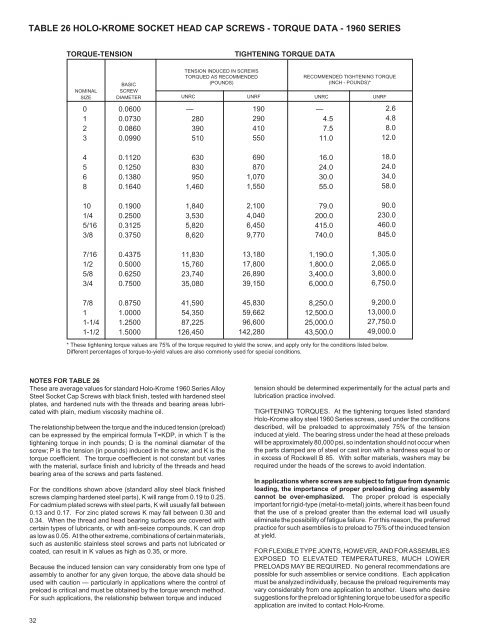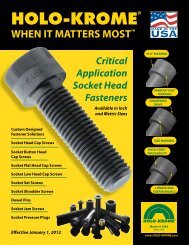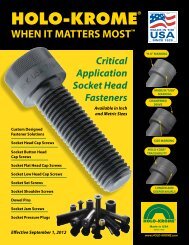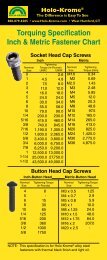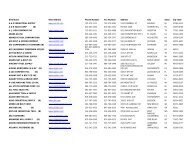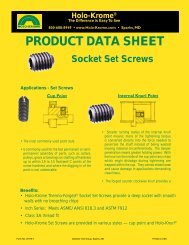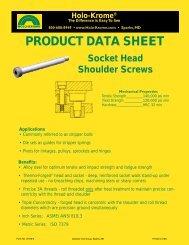Consolidated Tech Man - Holo-Krome
Consolidated Tech Man - Holo-Krome
Consolidated Tech Man - Holo-Krome
You also want an ePaper? Increase the reach of your titles
YUMPU automatically turns print PDFs into web optimized ePapers that Google loves.
TABLE 26 HOLO-KROME SOCKET HEAD CAP SCREWS - TORQUE DATA - 1960 SERIES<br />
32<br />
TORQUE-TENSION TIGHTENING TORQUE DATA<br />
NOMINAL<br />
SIZE<br />
0<br />
1<br />
2<br />
3<br />
4<br />
5<br />
6<br />
8<br />
10<br />
1/4<br />
5/16<br />
3/8<br />
7/16<br />
1/2<br />
5/8<br />
3/4<br />
7/8<br />
1<br />
1-1/4<br />
1-1/2<br />
BASIC<br />
SCREW<br />
DIAMETER<br />
0.0600<br />
0.0730<br />
0.0860<br />
0.0990<br />
0.1120<br />
0.1250<br />
0.1380<br />
0.1640<br />
0.1900<br />
0.2500<br />
0.3125<br />
0.3750<br />
0.4375<br />
0.5000<br />
0.6250<br />
0.7500<br />
0.8750<br />
1.0000<br />
1.2500<br />
1.5000<br />
TENSION INDUCED IN SCREWS<br />
TORQUED AS RECOMMENDED<br />
(POUNDS)<br />
UNRC UNRF<br />
—<br />
280<br />
390<br />
510<br />
630<br />
830<br />
950<br />
1,460<br />
1,840<br />
3,530<br />
5,820<br />
8,620<br />
11,830<br />
15,760<br />
23,740<br />
35,080<br />
41,590<br />
54,350<br />
87,225<br />
126,450<br />
* These tightening torque values are 75% of the torque required to yield the screw, and apply only for the conditions listed below.<br />
Different percentages of torque-to-yield values are also commonly used for special conditions.<br />
NOTES FOR TABLE 26<br />
These are average values for standard <strong>Holo</strong>-<strong>Krome</strong> 1960 Series Alloy<br />
Steel Socket Cap Screws with black finish, tested with hardened steel<br />
plates, and hardened nuts with the threads and bearing areas lubricated<br />
with plain, medium viscosity machine oil.<br />
The relationship between the torque and the induced tension (preload)<br />
can be expressed by the empirical formula T=KDP, in which T is the<br />
tightening torque in inch pounds; D is the nominal diameter of the<br />
screw; P is the tension (in pounds) induced in the screw; and K is the<br />
torque coefficient. The torque coeffiecient is not constant but varies<br />
with the material, surface finish and lubricity of the threads and head<br />
bearing area of the screws and parts fastened.<br />
For the conditions shown above (standard alloy steel black finished<br />
screws clamping hardened steel parts), K will range from 0.19 to 0.25.<br />
For cadmium plated screws with steel parts, K will usually fall between<br />
0.13 and 0.17. For zinc plated screws K may fall between 0.30 and<br />
0.34. When the thread and head bearing surfaces are covered with<br />
certain types of lubricants, or with anti-seize compounds, K can drop<br />
as low as 0.05. At the other extreme, combinations of certain materials,<br />
such as austenitic stainless steel screws and parts not lubricated or<br />
coated, can result in K values as high as 0.35, or more.<br />
Because the induced tension can vary considerably from one type of<br />
assembly to another for any given torque, the above data should be<br />
used with caution — particularly in applications where the control of<br />
preload is critical and must be obtained by the torque wrench method.<br />
For such applications, the relationship between torque and induced<br />
190<br />
290<br />
410<br />
550<br />
690<br />
870<br />
1,070<br />
1,550<br />
2,100<br />
4,040<br />
6,450<br />
9,770<br />
13,180<br />
17,800<br />
26,890<br />
39,150<br />
45,830<br />
59,662<br />
96,600<br />
142,280<br />
RECOMMENDED TIGHTENING TORQUE<br />
(INCH - POUNDS)*<br />
UNRC UNRF<br />
—<br />
4.5<br />
7.5<br />
11.0<br />
16.0<br />
24.0<br />
30.0<br />
55.0<br />
79.0<br />
200.0<br />
415.0<br />
740.0<br />
1,190.0<br />
1,800.0<br />
3,400.0<br />
6,000.0<br />
8,250.0<br />
12,500.0<br />
25,000.0<br />
43,500.0<br />
2.6<br />
4.8<br />
8.0<br />
12.0<br />
18.0<br />
24.0<br />
34.0<br />
58.0<br />
90.0<br />
230.0<br />
460.0<br />
845.0<br />
1,305.0<br />
2,065.0<br />
3,800.0<br />
6,750.0<br />
9,200.0<br />
13,000.0<br />
27,750.0<br />
49,000.0<br />
tension should be determined experimentally for the actual parts and<br />
lubrication practice involved.<br />
TIGHTENING TORQUES. At the tightening torques listed standard<br />
<strong>Holo</strong>-<strong>Krome</strong> alloy steel 1960 Series screws, used under the conditions<br />
described, will be preloaded to approximately 75% of the tension<br />
induced at yield. The bearing stress under the head at these preloads<br />
will be approximately 80,000 psi, so indentation should not occur when<br />
the parts clamped are of steel or cast iron with a hardness equal to or<br />
in excess of Rockwell B 85. With softer materials, washers may be<br />
required under the heads of the screws to avoid indentation.<br />
In applications where screws are subject to fatigue from dynamic<br />
loading, the importance of proper preloading during assembly<br />
cannot be over-emphasized. The proper preload is especially<br />
important for rigid-type (metal-to-metal) joints, where it has been found<br />
that the use of a preload greater than the external load will usually<br />
eliminate the possibility of fatigue failure. For this reason, the preferred<br />
practice for such asemblies is to preload to 75% of the induced tension<br />
at yield.<br />
FOR FLEXIBLE TYPE JOINTS, HOWEVER, AND FOR ASSEMBLIES<br />
EXPOSED TO ELEVATED TEMPERATURES, MUCH LOWER<br />
PRELOADS MAY BE REQUIRED. No general recommendations are<br />
possible for such assemblies or service conditions. Each application<br />
must be analyzed individually, because the preload requirements may<br />
vary considerably from one application to another. Users who desire<br />
suggestions for the preload or tightening torque to be used for a specific<br />
application are invited to contact <strong>Holo</strong>-<strong>Krome</strong>.


